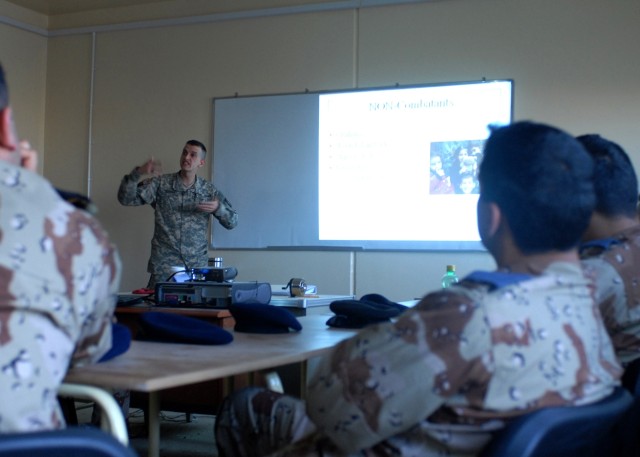CAMP TAJI, Iraq (Mar. 10, 2008) -- Teaching law to brand-new military officers can get pretty complicated. The nuances and "what if" scenarios can be so confusing, they might as well be written in Arabic.
For an American Army staff judge advocate, teaching those laws to Iraqi air force cadets, the best way to clear up the confusion was to do just that.
Maj. James Teixeira, an Army attorney for the 12th Combat Aviation Brigade, has been teaching the law of armed conflict and military justice classes for years. They are required classes for the Army; American Soldiers get at least some version of the training about every six months.
Teaching it to Iraqis using Arabic text was something Teixeira wasn't quite accustomed to.
"Most of the American Soldiers have had the class before, so it's not particularly new to them," said Teixeira. "With the Iraqi cadets, my impression was that this was all new to them, so they had a lot more questions."
The cadets are students at the Iraqi air Force Training School here. The school has been training future air force officers, using American curriculum, since April 2007.
The instructors are American Airmen assigned to the 370th Expeditionary Training Squadron.
Most were selected because of their previous experience as instructors at more traditional Air Force schools.
"The language barrier is a challenge," said Capt. Alisa Thomas, a former Air Force ROTC instructor at the University of Ohio. "You have to learn how to say things several different ways, and you have to know how to get them involved and ask the right questions to make sure they actually understand what you're saying."
The academy, and its sister school, the Iraqi Military Academy in Rustamiyah, are responsible for equipping a new generation of Iraqi military officers with the skills to lead their rapidly growing services into the future.
The students are recent college graduates, most with engineering degrees, who will learn the basics of leadership here before going on to specific training for their career specialties. Many will soon be pilots flying the skies of Iraq and facing the same decisions coalition pilots have been facing since the beginning of the war.
"They like things they believe they can use right away," said Thomas. "When we take them to see the aircraft or teach them about aviation fundamentals, they eat that stuff up and ask lots of questions. Law of armed conflict is one of those things, too."
"The law of armed conflict requires us to use proportionality analysis -- to weigh the value of a target versus the potential damage," said Teixeira. "The goal is to minimize the risk to civilians. That's really the key (point), whether I'm giving the class to Americans or Iraqis. I think they got that, and there was no push back.
"Sometimes when you're teaching this stuff you get some (resistance), but I think the Iraqis got it in terms of the real goal, regardless of the type of conflict, is to protect the civilian populace," he said. "That needs to be the key factor in their minds when they're making targeting decisions and are about to engage."
The law of armed conflict, while perhaps new to the Iraqi students, is the same for both the United States and Iraq. It's based on international law found in the Geneva and Hague conventions, said Teixeira.
What was different for him was teaching an Iraqi military justice system, a slightly modified version of a system that has been in effect in this country since the 1970s.
"They haven't adopted our system, and we haven't tried to give them our system," said Teixeira. "The principles are the same. The Soldier's got rights, and the commander's got certain responsibilities to protect those rights and to enforce military discipline."
Aside from the language barriers, and some confusion over when to go on to the next slide, the training went well, he said.
"It was a positive experience all the way around," he said. "The students had a lot of questions, which showed that they were thinking about it, and they cared about what was the right thing to do and what was the wrong thing to do."
The 12th CAB, a U.S. Army Europe unit headquartered in Ansbach, Germany, is deployed in Iraq as the lead element of Task Force XII, the aviation task force that supports Multi-National Division - Baghdad.


Social Sharing